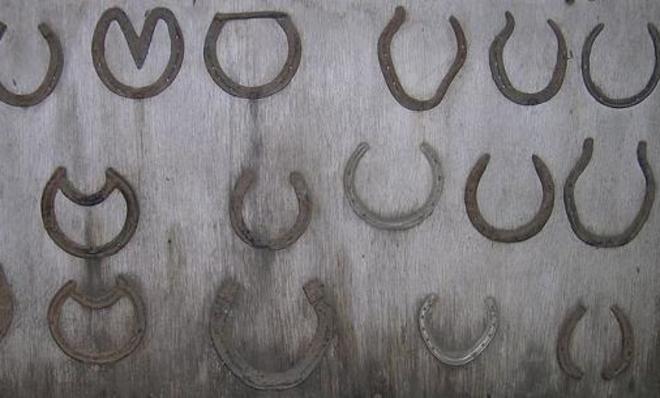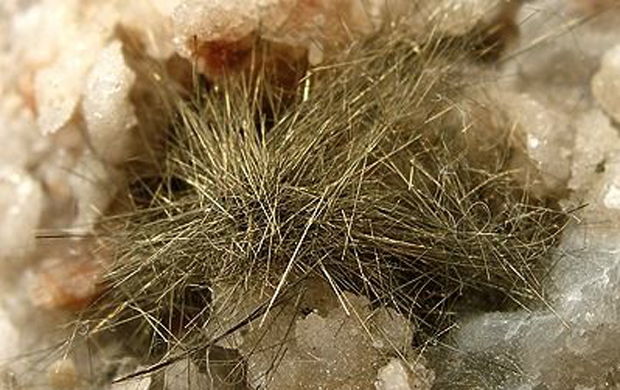Impress your friends with these 18 fancy words for specific shapes
There's even a word for horseshoe-shaped (though it takes just as long to say as "shaped like a horseshoe")


A free daily email with the biggest news stories of the day – and the best features from TheWeek.com
You are now subscribed
Your newsletter sign-up was successful
Circle, square, triangle — boring! There are so many more shapes than those in nature. Good thing there's a rich vocabulary of fancy scientific words for shapes. Most of them don't get much use, which is a shame. Get to know a few of these, and describe your world with lexical flair.
1. ACICULAR // NEEDLE SHAPED

This word is used by botanists to describe leaves with a long pointy shape and by mineralogists in talking about crystals.
The Week
Escape your echo chamber. Get the facts behind the news, plus analysis from multiple perspectives.

Sign up for The Week's Free Newsletters
From our morning news briefing to a weekly Good News Newsletter, get the best of The Week delivered directly to your inbox.
From our morning news briefing to a weekly Good News Newsletter, get the best of The Week delivered directly to your inbox.
2. ACETABULIFORM // SAUCER SHAPED
Occasionally useful in botany or geology. Your hip socket also goes by "acetabulum."
3. ANGUILLIFORM // EEL SHAPED
A free daily email with the biggest news stories of the day – and the best features from TheWeek.com
Anguilliform locomotion — forward movement caused by sideways undulation — is fascinating to physicists.
4. CALCEIFORM // SLIPPER SHAPED
Some flower petals are calceiform — they look like little shoes. Not to be confused with calciform (shaped like pebbles).
5. CLITHRIDIATE // KEYHOLE SHAPED
Not much seen outside of 19th century descriptions of invertebrate fossils, but fun to say.
6. COCHLEATE // SNAIL SHAPED
(Thinkstock)
Plant parts or chemical compounds can be cochleate — rolled into a spiral like a snail shell. Also cochleate, the spiral tube in your inner ear known as the cochlea.
7. FABIFORM // BEAN SHAPED
Here's a good sentence from a 1909 book on rocks: "iron often inclines to the pisiform and fabiform." (Pisiform means pea shaped.)
8. FALCATE // SICKLE SHAPED
The butterfly known as the Falcate Orangetip has wings that curve and taper to a pointed tip.
9. FLABELLATE // FAN SHAPED
Insects with flabellate antennae look like they have two little fans attached to their head. If you prefer Greek roots over Latin, another word for this is rhipidate.
10. HASTATE // SPEARHEAD SHAPED
Leaves or anatomical structures that look like spearheads are hastate, from the Latin hasta for spear.
11. HIPPOCREPIFORM // HORSESHOE SHAPED
Here's a convenient word for horseshoe-shaped … that takes just as long to say as "shaped like a horseshoe."
12. HORDEIFORM // BARLEYCORN SHAPED
(Thinkstock)
If it looks like a grain of barley, it's hordeiform.
13. ICHTHYOMORPHIC // FISH SHAPED
(Thinkstock)
Goldfish crackers aren't fish, but they are ichthyomorphic.
14. LACHRYMIFORM // TEAR SHAPED
Apple seeds and watermelon seeds are lachrymiform.
15. RENIFORM // KIDNEY SHAPED
Kidney beans may be reniform, but actual kidneys are fabiform.
16. SCAPHOID // BOAT SHAPED
(DBCLS)
The most commonly broken bone in the wrist, the scaphoid, looks like a little boat.
17. SCYPHOID // CUP SHAPED
(Thinkstock)
The ancient Greek skyphos, a two handled drinking vessel, gives its name to cup-shaped objects such as jellyfish, of the biological class Scyphozoa.
18. XIPHOID // SWORD SHAPED
From the Greek xiphos for sword. If you prefer Latin roots, there's ensiform (from Latinensis). The little piece of pointy cartilage at the bottom of your sternum where the lowest ribs meet is called the xiphoid process.
Arika Okrent is editor-at-large at TheWeek.com and a frequent contributor to Mental Floss. She is the author of In the Land of Invented Languages, a history of the attempt to build a better language. She holds a doctorate in linguistics and a first-level certification in Klingon. Follow her on Twitter.
-
 Switzerland could vote to cap its population
Switzerland could vote to cap its populationUnder the Radar Swiss People’s Party proposes referendum on radical anti-immigration measure to limit residents to 10 million
-
 Political cartoons for February 15
Political cartoons for February 15Cartoons Sunday's political cartoons include political ventriloquism, Europe in the middle, and more
-
 The broken water companies failing England and Wales
The broken water companies failing England and WalesExplainer With rising bills, deteriorating river health and a lack of investment, regulators face an uphill battle to stabilise the industry

